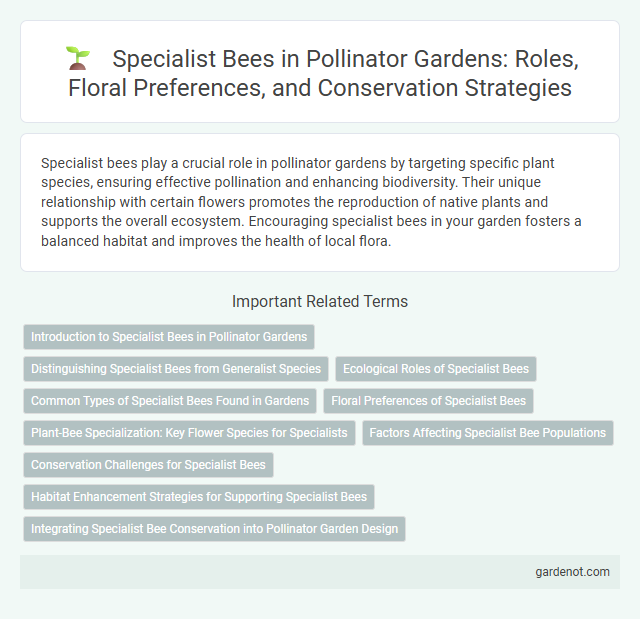Specialist bees play a crucial role in pollinator gardens by targeting specific plant species, ensuring effective pollination and enhancing biodiversity. Their unique relationship with certain flowers promotes the reproduction of native plants and supports the overall ecosystem. Encouraging specialist bees in your garden fosters a balanced habitat and improves the health of local flora.
Introduction to Specialist Bees in Pollinator Gardens
Specialist bees play a crucial role in pollinator gardens by targeting specific plants, enhancing pollination efficiency and biodiversity. Unlike generalist bees, these species have evolved to forage on particular flowers, promoting the reproduction of native flora and supporting ecosystem stability. Incorporating plants favored by specialist bees boosts garden productivity and fosters habitat conservation.
Distinguishing Specialist Bees from Generalist Species
Specialist bees, such as the squash bee (Peponapis pruinosa), exhibit floral fidelity by exclusively foraging on specific plant species, unlike generalist bees that visit a wide variety of flowers. This specialization allows specialist bees to efficiently pollinate their preferred plants, often resulting in higher pollination success rates and contributing crucially to the reproduction of certain crop species. Morphological adaptations like specialized mouthparts and behavioral traits further distinguish specialist bees from their generalist counterparts within pollinator gardens.
Ecological Roles of Specialist Bees
Specialist bees play a crucial ecological role by pollinating specific plant species, enhancing biodiversity and ecosystem stability. These bees exhibit co-evolutionary relationships with their host plants, ensuring efficient pollen transfer that supports the reproductive success of native flora. Their targeted foraging behavior helps maintain plant community dynamics and contributes to the resilience of pollinator gardens.
Common Types of Specialist Bees Found in Gardens
Specialist bees in gardens, such as mason bees, leafcutter bees, and squash bees, play a crucial role in pollinating specific plant species. Mason bees primarily pollinate fruit trees like apples and cherries, while leafcutter bees are known for their efficiency with alfalfa and other wildflowers. Squash bees are highly specialized for pollinating cucurbit plants such as pumpkins and squash, making them vital for successful garden yields.
Floral Preferences of Specialist Bees
Specialist bees exhibit strong floral preferences, often relying on specific plant species or genera for nectar and pollen, which supports their unique role in pollination ecology. These bees have co-evolved with particular flowers, displaying adaptations such as specialized mouthparts or foraging behaviors tailored to their preferred plants. Understanding the floral preferences of specialist bees is crucial for designing pollinator gardens that promote biodiversity and sustain their specialized pollination partnerships.
Plant-Bee Specialization: Key Flower Species for Specialists
Specialist bees rely on specific plant species such as milkweed, goldenrod, and asters for nectar and pollen, demonstrating a high degree of plant-bee specialization. These key flower species provide essential nutrients that support the life cycles of specialist bees like the squash bee and the mining bee. Cultivating these plants in a pollinator garden enhances biodiversity and ensures the survival of specialist bee populations.
Factors Affecting Specialist Bee Populations
Specialist bee populations are influenced by the availability of specific host plants, habitat fragmentation, and pesticide exposure. These bees rely on particular floral resources, making habitat loss and monoculture practices detrimental to their survival. Climate change also disrupts flowering times, further stressing specialist bee communities in pollinator gardens.
Conservation Challenges for Specialist Bees
Specialist bees face significant conservation challenges due to their reliance on specific host plants, which makes them highly vulnerable to habitat loss and environmental changes. Habitat fragmentation and agricultural practices that reduce native flora diversity directly threaten their survival and disrupt pollination networks. Conservation efforts must prioritize preserving and restoring native plant species to support these critical pollinators and maintain ecosystem health.
Habitat Enhancement Strategies for Supporting Specialist Bees
Specialist bees require habitat enhancement strategies that prioritize planting native floral species closely aligned with their pollen preferences to ensure adequate nutrition and reproduction. Enhancing habitat complexity with diverse flowering periods supports these bees by providing continuous foraging resources throughout their active seasons. Incorporating nesting substrates such as bare ground or hollow stems tailored to the specific nesting habits of specialist bees promotes successful breeding and population stability.
Integrating Specialist Bee Conservation into Pollinator Garden Design
Incorporating specialist bee conservation into pollinator garden design enhances biodiversity by supporting bee species with specific floral preferences, such as the squash bee (Peponapis pruinosa) and the orchard mason bee (Osmia lignaria). Selecting native plants that match the foraging requirements of these bees ensures critical habitat and food sources, promoting pollination efficiency and ecosystem resilience. Designing gardens with nesting substrates like bare soil patches or hollow stems further supports specialist bee populations and their vital role in crop and wild plant pollination.
Specialist bee Infographic

 gardenot.com
gardenot.com